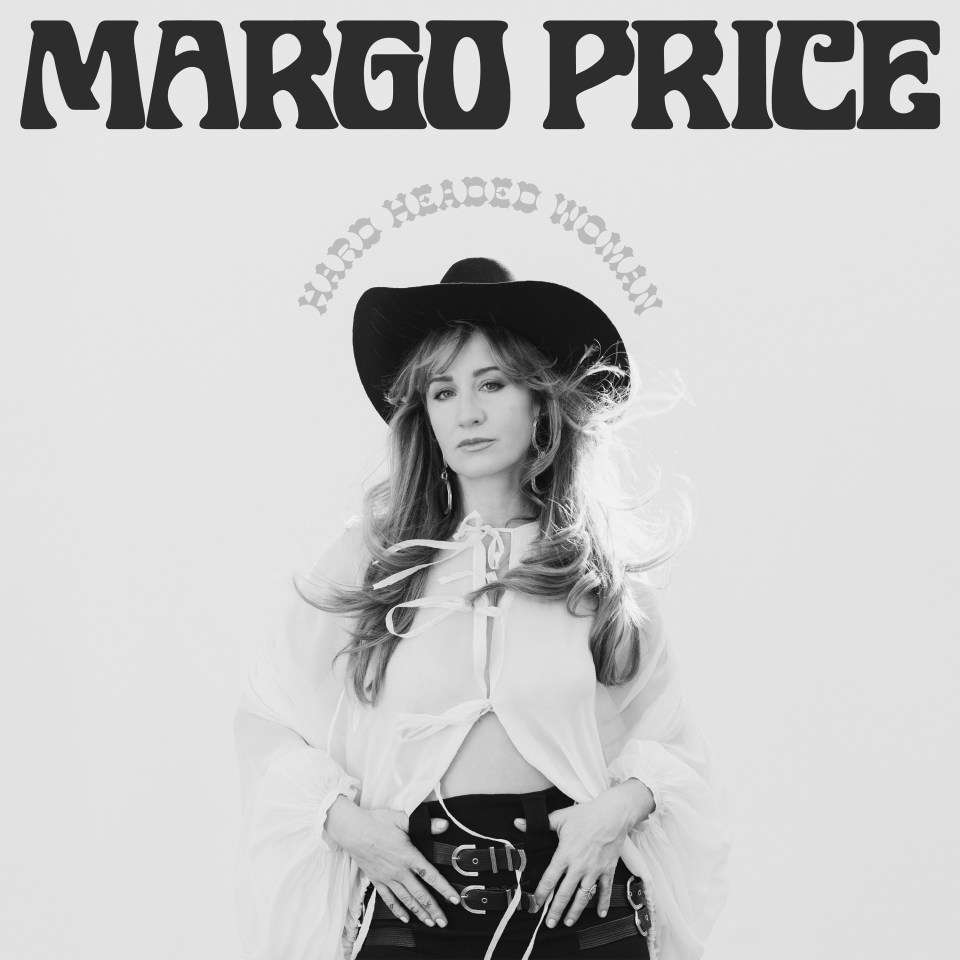IT should come as no surprise that Margo Price channels the spirit of the country music “outlaws”.
Johnny Cash, Waylon Jennings, Kris Kristofferson and her dear friend Willie Nelson, the last one standing at 92.
They famously banded together to form The Highwaymen but I would add two women to the list — single-minded Loretta Lynn and Jennings’ widow Jessi Colter.
Like them all, Margo is a fiercely independent artist who tells it like it is — a natural keeper of their flame.
Though she lives in Nashville, she refuses to be controlled by the Music City machine and prizes her creative freedom.
Her latest record is a stirring return to her country roots following the trippy rock textures of 2023’s Strays.
Fittingly titled Hard Headed Woman, it evokes the sound of her much-loved 2016 debut, Midwest Farmer’s Daughter, while drawing on another decade of life experience.
Sessions took place at Nashville’s historic RCA Studio A, “haunted but in a good way” by those who had walked its parquet floor before, Waylon and Loretta among them.
The record reunites Margo with original co-producer Matt Ross-Spang and was made with encouragement from alt-country legends Emmylou Harris and Rodney Crowell.
“For me, it’s about being the best Margo I can be,” the 42-year-old tells me. “There might be better singers, they might have a better budget but nobody else can make a record like Margo.
“I just needed to get back in there with songwriting that is gritty and has dirt under its fingernails.”
I well remember how Margo lit up my computer screen during a video call in the depths of winter 2022/23 to talk about Strays.
But nothing quite prepares me for our face-to-face encounter at her record label offices in London’s Aldwych on a sweltering summer’s day.
Just off a plane from the States, she saunters into the lobby attired in denim shorts, a sleeveless lacy black top and cowboy boots.
For the best part of an hour in her company, I find myself being mesmerised by the irrepressible singer — a magnetic personality with a wonderful turn of phrase.
Her new album has strong connections to those aforementioned country renegades.
She sets the scene by explaining Prelude (Hard Headed Woman), which serves as the fiddle-backed title track, clocking in at a mere 52 seconds. “I don’t want to give anything away too directly, but everybody knows Willie Nelson hung the moon as far as I’m concerned.”
For Margo, particular inspiration came from Willie’s celebrated 1975 concept album, Red Headed Stranger.
She says: “I’ve played that record to death. I love how it has parts that keep coming back around, tying everything together.” She has crossed paths with Nelson on many occasions and treasures the times they have spent together, on and off stage.
“To have that level of fame and success, and to still keep his feet firmly on the ground — he’s amazing,” she adds by way of expressing her admiration.
There might be better singers, they might have a better budget but nobody else can make a record like Margo
It’s clearly a way of being that Margo aspires to.
On Prelude, she intones: “I ain’t ashamed — I just am what I am.”
Does she consider herself to be hard-headed, someone who doesn’t take s**t from anyone, I venture.
“Yeah, that’s right,” she replies. “For better or worse, I’ve always been determined and strong-willed. These were adjectives my parents used about me.”
Her last comment prompts a laugh-out-loud Margo anecdote.
“About a year and a half ago, I went in for surgery because I couldn’t breathe very well,” she reveals. “I was breathing through my mouth at night.
“This guy, a special surgeon who works on singers, took X-rays of my skull and told me I had a deviated septum.
“He also said, ‘You have the thickest skull I’ve ever seen’. And I said, ‘My husband would agree’.”
Margo’s partner — guitarist, songwriter and father of her children, Jeremy Ivey — has been with her for every step of her music career.
“He’s my sounding board,” she says. “But I think he would support me in whatever I wanted to do.”
This brings us to one of the album’s pivotal tracks, the rollicking rallying cry Don’t Let The Bastards Get You Down, a co-write with Ivey and Rodney Crowell.
It comes with a posthumous credit for Kris Kristofferson who whispered the phrase to Sinead O’Connor when she was booed during Bob Dylan’s 30th anniversary show at New York’s Madison Square Garden in 1992.
Margo says: “It was such a classy move by Kris to say that, rather than shoo Sinead off stage. I believe she replied, ‘They won’t!’. She was defiant. I loved her so much.
“When I was little, I didn’t quite understand why Sinead ripped up a picture of the Pope but when I heard about the abuse [in Ireland], I understood the whole thing.
“And when she died, I think she herself would have been stunned at the response.”
As for Kristofferson, Margo says: “It’s not that long since we lost him. He was a once-in-a-lifetime artist and I love his songwriting so much.
“I first met him at Newport Folk Festival in 2015 when I was asked to join him on stage for Me And Bobby McGee, all because Patti Smith got stuck in traffic.”
In the years since, Margo witnessed first-hand Kristofferson’s struggle with memory loss. “It was like meeting him over and over again,” she says. “He would always smile at me, give me a hug and a kiss, but I never knew if he remembered who I was.
“At Willie Nelson’s 90th birthday bash at the Hollywood Bowl, Kris and his wife watched me on stage.
“She told me afterwards that he turned to her and said, ‘I think I know that lady’. That meant so much to me.”
‘Bro country’
Margo sees Don’t Let The Bastards Get You Down as an anthem for difficult times.
Kristofferson wasn’t the first to use the expression. It appears in Margaret Atwood’s dystopian novel The Handmaid’s Tale, published in 1985.
The central character Offred finds it crudely scratched in Latin — Nolite te Bastardes Carborundorum — inside her bedroom cupboard.
Although the book deals with extreme oppression of women, Margo finds parallels in today’s America.
She says: “It’s hard to be a woman in the South, raising a daughter, while they’re stripping away our rights. It feels like a battleground.
“They don’t take everything away at once but one thing at a time. You become desensitised to it but it’s definitely happening before our eyes.”
Margo adds that her song is “also pointed at some people in the music business — because that seems to be where a lot of my anger goes!”.
Chief among her targets are “big corporations and streaming companies”.
“As musicians, we can’t unionise because we’re listed as independent contractors,” she says. “If people are making money, it’s not going to most of the artists.”
She continues with a dig about Nashville’s mainstream music scene: “I’ve not been welcomed with open arms by the country music industry.
“But I’m not concerned about being on country radio because they hardly play women at all. What they do play, dare I say it, is bro country — overproduced pop.” That spirit of defiance continues through many tracks on Hard Headed Woman.
Fast-paced Don’t Wake Me Up echoes Dylan’s Subterranean Homesick Blues.
Red Eye Flight reflects on Margo’s tough decision to drop her longtime band, the Pricetags. Love Me Like You Used To Do is a waltzing duet with Tyler Childers in the grand tradition of George Jones and Tammy Wynette or Loretta Lynn and Conway Twitty.
Weepy ballad Close To You began life many years ago but contains a line that resonates today: “We played the jukebox while democracy fell.”
Margo says: “It’s my favourite line on the record — but I wrote it back in 2003. I guess things were already starting to crumble at thatpoint.”
And there’s one final and important link to those kickass country icons from whom Margo takes her cue.
The album closes with a cover of Waylon Jennings’ song Kissin’ You Goodbye, given to her by his country singer widow, Jessi, 82.
They became such good friends that Margo produced Jessi’s fine 2023 album Edge Of Forever.
“I was impersonating her singing Why You Been Gone So Long,” says Margo, explaining how they first made contact.
“Somehow Jessi saw a YouTube version and called me out of the blue. She said, ‘I’d love to meet you some day’.
“She became a mentor. I talk to her about things that maybe friends my own age don’t quite understand. Having kids, travelling, all the ups and downs along the way.”
Margo remembers one particular day when they’d “had a few drinks and Jessi brought out an old suitcase of Waylon songs”.
One was Kissin’ You Goodbye, written “about his old lawyer who was also his drug dealer”. The pair had been on a five-day bender. When they returned, the lawyer’s wife “got real mad”.
“When he tried to kiss her, she said, ‘Get your tongue out of my mouth, I’m kissing you goodbye’. That line became the chorus of Waylon’s song.”
Margo adds: “Jessi told me, ‘I’m too old to record it, but you should’. So I put it in my back pocket. I knew that when I was ready to make a country record again, I would cut it.
“Waylon did a version that is a little more chill but we souped it up like a hot rod.”
You wouldn’t expect anything less from the live wire that is Margo Price.















